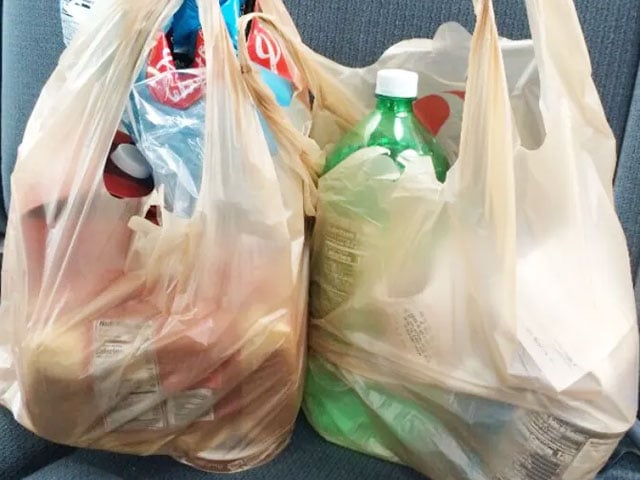Lahore: In Punjab, the largest province of Pakistan, the use of single-use plastic is being banned once again from June 5. Experts say that the increasing use of plastic is causing problems such as environmental pollution, human health, threats to aquatic life, increase in waste piles and economic loss.
Sahib Din, Chief Executive Officer of Lahore Waste Management Company, told Express News that our sewage system is badly affected due to single-use plastic, drains and drains get blocked. He said that according to LWMC’s survey, 400 tons of plastic is included in the waste collected in Lahore every day, which is brought to the dumping site.
Sahib Din said that plastic waste cannot even be composted and despite being stuck in the garbage for hundreds of years, it does not end and it pollutes the soil and water. This pollution damages agricultural production and affects our food supply.
Environmentalist Dr. Sadia Khalid told Express News that the presence of plastic in rivers, lakes, and oceans is harmful to aquatic life. Fish and other aquatic organisms ingest plastic particles as food, which causes their death. In addition, sea birds and other animals are also killed by getting caught in plastic nets.
Chemicals in plastic products, such as BPA and phthalates, are extremely harmful to human health, he said. These chemicals can cause hormonal changes, infertility, cancer, and heart disease. Plastic particles enter the human body through air, water and food and cause various diseases.
Experts say that the habits of using plastic make us away from social responsibility. Due to lack of awareness among the public, people use plastic items indiscriminately and do not dispose them properly.
Educational and awareness campaigns are needed to change this attitude. The negative effects of plastic use on society and the environment are profound. We have to take this issue seriously and promote the reduction of plastic use, recycling, and the use of alternative materials.
Punjab Senior Minister Maryam Aurangzeb says that the government is imposing a complete ban on plastic bags across Punjab. This ban will be strictly enforced and alternative biodegradable bags will be encouraged.
To develop recycling infrastructure, recycling centers will be established and the public will be educated on how to properly recycle plastic products. In addition, support will be provided to promote the recycling industry.
He said that strict rules will be made for plastic waste management and these rules will be strictly implemented. The public will be trained for proper disposal of plastic waste and fines and penalties will be prescribed in this regard.
Maryam Aurangzeb said that from June 5, a crackdown will be started against factories manufacturing illegal plastic products, there will be a strict ban on serving food in plastic bags to customers at hotels, restaurants and other food points.
Senior provincial minister Maryam Aurangzeb said that according to the law, the use of polythene bags of less than 75 microns and single-use plastic utensils is completely banned, and an awareness campaign will be launched on the topic of “plastic is death” for the public on non-use of plastic. .
According to the report of the World Environment Organization, 19% of the toxic gases released globally by 2040 will be due to plastic. In March 2022, 193 countries agreed to eliminate plastic pollution. Currently, 430 million tons of plastic products are produced worldwide every year, two-thirds of these products have a short life and end up as waste.
(function(d, s, id){
var js, fjs = d.getElementsByTagName(s)[0];
if (d.getElementById(id)) {return;}
js = d.createElement(s); js.id = id;
js.src = “//connect.facebook.net/en_US/sdk.js#xfbml=1&version=v2.3&appId=770767426360150”;
fjs.parentNode.insertBefore(js, fjs);
}(document, ‘script’, ‘facebook-jssdk’));
(function(d, s, id) {
var js, fjs = d.getElementsByTagName(s)[0];
if (d.getElementById(id)) return;
js = d.createElement(s); js.id = id;
js.src = “//connect.facebook.net/en_GB/sdk.js#xfbml=1&version=v2.7”;
fjs.parentNode.insertBefore(js, fjs);
}(document, ‘script’, ‘facebook-jssdk’));



